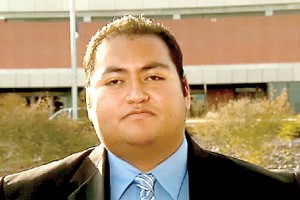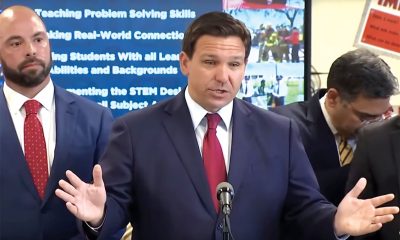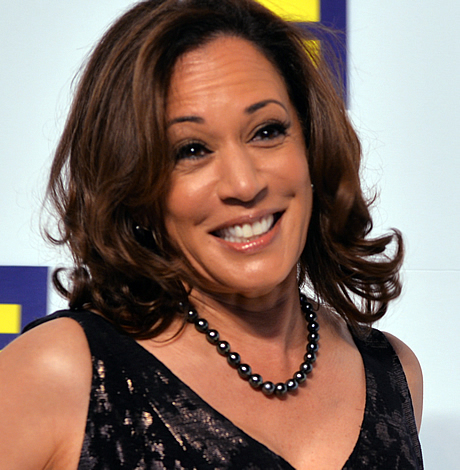National
Gay intern credited with saving Giffords
‘I heard gunshots, I ran toward where the congresswoman would be’

For Danny Hernandez, the shootings on Saturday in Tucson, Ariz., that critically wounded Rep. Gabrielle Giffords (D-Ariz.) were a life-changing moment during which many say he demonstrated unparalleled heroism.
Hernandez, who’s gay and had worked as an intern for Giffords for just five days at the time of the shooting, is credited with providing the first aid that saved her life.
In an interview with Washington Blade, Hernandez, 20, a political science student at the University of Arizona, said he was tasked with signing in visitors at the “Congress on Your Corner” event when the shooting began.
“About 10 minutes after the event started, I heard gunshots,” he said. “I heard someone say ‘Gun!’ I ran toward where the congresswoman would be.”
Giffords, who was shot in the forehead, was among the 20 people shot by 22-year-old gunman Jared Loughlin, who used a semi-automatic pistol with an extended magazine during his attack. Six people were killed, including five who died at the scene and a 9-year-old girl who died at the hospital.
“The attitude that I had,” Hernandez said, “was trying to make sure that those who had been injured were going to be OK, so to try to provide whatever first aid I could until someone else could come in and take over.”
When he reached Giffords, Hernandez said he noticed others had been shot, and said his first priority was to determine who was still alive.
“Once I saw that the congresswoman was still alive, but she had been severely injured, she became my first priority, not because of her position, but because of the severity of her wounds,” Hernandez said.
After assessing Giffords’s injuries, Hernandez propped her up against his chest to keep her from asphyxiating on her own blood. Once she was able to breathe again, Hernandez applied pressure to stem the blood loss as much as possible.
Medics arrived on the scene to take Giffords and others to the University Medical Center in Arizona. Doctors are now optimistic about her recovery. The first aid provided by Hernandez, who said his only training was through a certified nursing assistant program in high school, is widely seen as responsible for saving her life.
Amid the media frenzy and shock over the shootings, Hernandez has emerged a figure of hope after rushing into danger to save Giffords. In the days since the shooting, Hernandez has appeared on national TV for interviews with CNN, the “Today” show and MSNBC’s Rachel Maddow.
Back home in Arizona, Hernandez has been praised for his actions. The Arizona State Legislature on Monday gave him a standing ovation after Gov. Jan Brewer (R) applauded his deeds during her State of the State address.
“Daniel Hernandez, a University of Arizona junior showed no fear in the face of gunfire,” Brewer said. “His quick action in going to Gabby Giffords’s aid likely saved her life.”
Hernandez said he was “very proud” to receive the honor afforded to him by the state legislature and the Arizona governor, but expressed modesty over his accomplishment.
“I’m a little press shy, and trying to control it as much as possible because the only thing I really care about right now is making sure that those people who survived get better and that we give support to their family members,” he said.
Hernandez also demurred when asked by the Blade whether he thinks he should be labeled a hero for his actions.
“Using words like ‘hero,’ I think, is kind of not the appropriate word because although those who did step in and took some action were brave, the real heroes are the people like Congresswoman Giffords … and the people who dedicated their lives to public service,” Hernandez said.
Dedicating much of her life to public service, Giffords was elected to the Arizona State Legislature in 2000 before becoming a congresswoman in 2007. Seen by many as a liberal for her support for abortion rights, health care reform and the stimulus package, Giffords beat her Republican opponent, Tea Party candidate Jesse Kelly, to win re-election in November 2010.
Hernandez said he wanted to work for Giffords because he’s been following her since she was a state legislator. After a stint working on Hillary Clinton’s presidential campaign in 2008, Hernandez said he had many interactions with Giffords and they became friends. After she won re-election last year, he decided to go to work for her.
“She was just an impressive person whom I always admired,” Hernandez said. “And in November of 2010, after she won her seat here again, one of the first things I did after she won was to make sure I applied to an internship with her office because I wanted to continue working with her as much as possible.”
On LGBT issues, Giffords’s record is mostly positive. The Human Rights Campaign gave her a score of 81 out of 100 for support for pro-gay legislation in the 110th Congress.
Giffords voted for hate crimes protections legislation and repeal of “Don’t Ask, Don’t Tell.” She additionally was a co-sponsor of a trans-inclusive Employment Non-Discrimination Act. She was not a co-sponsor of the Uniting American Families Act or legislation that would repeal the Defense of Marriage Act.
Even though he has a background in political science, Hernandez said LGBT issues haven’t been one of his priorities and said he’s more interested in public service in general.
“That’s why I worked for her office, not because of any one issue but because I wanted to be involved and wanted to be involved in the political process and trying to help others,” he said.
The degree to which political discourse in America influenced the shootings has emerged as a central discussion topic. Many pundits have questioned whether right-wing rhetoric against health care reform, which Giffords’ supported, contributed to the action that nearly took her life.
Giffords was among 20 members of Congress targeted by Sarah Palin on her website for supporting health care reform. Palin’s site included a map with Giffords’s district depicted in crosshairs. The map has been removed from Palin’s site.
John Aravosis, the gay editor of Americablog, said Palin “shares a great deal of responsibility” for feeding what he called “America’s culture of violence.”
“Just go to Western Europe, walk around in any capital at 2 or 3 in the morning, then try to do the same in Washington, D.C.,” Aravosis said. “It’s different in America.”
Aravosis said conservative leaders like Palin — as well as personalities like Glenn Beck and Rush Limbaugh — tap into the culture of violence in the hopes that it will help Republicans win elections.
Among other things, Aravosis accused conservatives of contributing to violence by saying health care reform would lead to death panels for the elderly and insisting that President Obama pals around with terrorists.
“It’s the GOP that’s cheapened political discourse, since the founding of conservative talk radio, and things only went downhill when they created Fox,” Aravosis said. “I have no idea what can be done about it, other than shaming them, and hoping they learn to restrain themselves.”
Hernandez said he also believed the shootings show that political discourse in the country is “something that needs to change.”
“I think, if there’s anything that can be learned from this tragic incident, it’s that we need to make sure that we cut down on the fiery rhetoric,” he said. “Instead of trying to tear each other down and work on destructive criticism on both sides, we need to kind of come together as a nation regardless of every factor and try to work constructively to move this nation forward.”
In a video posted online Wednesday, Palin disputed the notion that conservative political discourse in some way contributed to the violence last week in Tucson and said people were making “irresponsible statements” to assign blame for the event.
“It is time to restore the American precept that each individual is accountable for his actions,” she said. “Acts of monstrous criminality stand on their own and they begin and end with the criminals who committed them, not collectively with all the citizens of a state, not with those who listen to talk radio, not with maps of swing districts used by both sides of the aisle, not with law-abiding citizens who respectfully exercise their First Amendment rights at campaign rallies, not with those who proudly voted in the last election.”
Asked whether he thinks Palin had a role in prompting the shootings, Hernandez said he’s not part of the investigation and doesn’t know what the causes were.
“I think the only thing that I can say is making sure that, in the future, we cut down on any kind of rhetoric, especially things that can be seen as something that may cause some violence in the future,” he said.
What does the future hold for Hernandez? He said he wants to pursue a role in public service and isn’t ruling anything out as part of that path.
“I don’t know in what capacity,” Hernandez said. “I’m not ruling anything out, but, right now, it’s too soon.”
Federal Government
Treasury Department has a gay secretary but LGBTQ staff are under siege
Agency reverses course on LGBTQ inclusion under out Secretary Scott Bessent

A former Treasury Department employee who led the agency’s LGBTQ employee resource group says the removal of sexual orientation and gender identity (SOGI) from its discrimination complaint forms was merely a formalization of existing policy shifts that had already taken hold following the second inauguration of President Donald Trump and his appointment of Scott Bessent — who is gay — to lead the agency.
Christen Boas Hayes, who served on the policy team at Treasury’s Financial Crimes Enforcement Network (FinCEN) from 2020 until March of this year, told the Washington Blade during a phone interview last week that the agency had already stopped processing internal Equal Employment Opportunity (EEO) complaints on the basis of anti-LGBTQ discrimination.
“So the way that the forms are changing is a procedural recognition of something that’s already happening,” said Hayes. “Internally, from speaking to two EEO staff members, the changes are already taking place from an EEO perspective on what kind of cases will be found to have the basis for a complaint.”
The move, they said, comes amid the deterioration of support structures for LGBTQ workers at the agency since the administration’s early rollout of anti-LGBTQ executive orders, which led to “a trickle down effect of how each agency implements those and on what timeline,” decisions “typically made by the assistant secretary of management’s office and then implemented by the appropriate offices.”
At the end of June, a group of U.S. House Democrats including several out LGBTQ members raised alarms after a Federal Register notice disclosed Treasury’s plans to revise its complaint procedures. Through the agency’s Office of Civil Rights and EEO, the agency would eliminate SOGI as protected categories on the forms used by employees to initiate claims of workplace discrimination.
But Hayes’s account reveals that the paperwork change followed months of internal practice, pursuant to a wave of layoffs targeting DEI personnel and a chilling effect on LGBTQ organizing, including through ERGs.
Hayes joined Treasury’s FinCEN in 2020 as the agency transitioned into the Biden-Harris administration, working primarily on cryptocurrency regulation and emerging technologies until they accepted a “deferred resignation” offer, which was extended to civil servants this year amid drastic staffing cuts.
“It was two things,” Hayes said. “One was the fact that the policy work that I was very excited about doing was going to change in nature significantly. The second part was that the environment for LGBTQ staff members was increasingly negative after the release of the executive orders,” especially for trans and nonbinary or gender diverse employees.
“At the same time,” Hayes added, “having been on the job for four years, I also knew this year was the year that I would leave Treasury. I was a good candidate for [deferred resignation], because I was already planning on leaving, but the pressures that emerged following the change in administration really pushed me to accelerate that timeline.”
Some ERGs die by formal edict, others by a thousand cuts
Hayes became involved with the Treasury LGBTQ ERG shortly after joining the agency in 2020, when they reached out to the group’s then-president — “who also recently took the deferred resignation.”
“She said that because of the pressure that ERGs had faced under the first Trump administration, the group was rebuilding, and I became the president of the group pretty quickly,” Hayes said. “Those pressures have increased in the second Trump administration.”
One of the previous ERG board members had left the agency after encountering what Hayes described as “explicitly transphobic” treatment from supervisors during his gender transition. “His supervisors denied him a promotion,” and, “importantly, he did not have faith in the EEO complaint process” to see the issues with discrimination resolved, Hayes said. “And so he decided to just leave, which was, of course, such a loss for Treasury and our Employee Resource Group and all of our employees at Treasury.”
The umbrella LGBTQ ERG that Hayes led included hundreds of members across the agency, they said, and was complemented by smaller ERGs at sub-agencies like the IRS and FinCEN — several of which, Hayes said, were explicitly told to cease operations under the new administration.
Hayes did not receive any formal directive to shutter Treasury’s ERG, but described an “implicit” messaging campaign meant to shut down the group’s activities without issuing anything in writing.
“The suggestion was to stop emailing about anything related to the employee resource group, to have meetings outside of work hours, to meet off of Treasury’s campus, and things like that,” they said. “So obviously that contributes to essentially not existing functionally. Because whereas we could have previously emailed our members comfortably to announce a happy hour or a training or something like that, now they have to text each other personally to gather, which essentially makes it a defunct group.”
Internal directories scrubbed, gender-neutral restrooms removed
Hayes said the dismantling of DEI staff began almost immediately after the executive orders. Employees whose position descriptions included the terms “diversity, equity, and inclusion” were “on the chopping block,” they said. “That may differ from more statutorily mandated positions in the OMWI office or the EEO office.”
With those staff gone, so went the infrastructure that enabled ERG programming and community-building. “The people that made our employee resource group events possible were DEI staff that were fired. And so, it created an immediate chilling effect on our employee resource group, and it also, of course, put fear into a lot of our members’ hearts over whether or not we would be able to continue gathering as a community or supporting employees in a more practical way going forward. And it was just, really — it was really sad.”
Hayes described efforts to erase the ERGs from internal communication channels and databases. “They also took our information off internal websites so nobody could find us as lawyers went through the agency’s internal systems to scrub DEI language and programs,” they said.
Within a week, Hayes said, the administration had removed gender-neutral restrooms from Main Treasury, removed third-gender markers from internal databases and forms, and made it more difficult for employees with nonbinary IDs to access government buildings.
“[They] made it challenging for people with X gender markers on identification documents to access Treasury or the White House by not recognizing their gender marker on the TWAVES and WAVES forms.”
LGBTQ staff lack support and work amid a climate of isolation
The changes have left many LGBTQ staff feeling vulnerable — not only because of diminished workplace inclusion, but due to concerns about job security amid the administration’s reductions in force (RIFs).
“Plenty of people are feeling very stressed, not only about retaining their jobs because of the layoffs and pending questions around RIFs, but then also wondering if they will be included in RIF lists because they’re being penalized somehow for being out at work,” Hayes said. “People wonder if their name will be given, not because they’re in a tranche of billets being laid off, but because of their gender identity or sexual orientation.”
In the absence of functional ERGs, Hayes said, LGBTQ employees have been cut off from even informal networks of support.
“Employees [are] feeling like it’s harder to find members of their own community because there’s no email anymore to ask when the next event is or to ask about navigating healthcare or other questions,” they said. “If there is no ERG to go to to ask for support for their specific issue, that contributes to isolation, which contributes to a worse work environment.”
Hayes said they had not interacted directly with Secretary Bessent, but they and others observed a shift from the previous administration. “It is stark to see that our first ‘out’ secretary did not host a Pride event this year,” they said. “For the last three years we’ve flown the rainbow Pride flag above Treasury during Pride. And it was such a celebration among staff and Secretary Yellen and the executive secretary’s office were super supportive.”
“Employees notice changes like that,” they added. “Things like the fact that the Secretary’s official bio says ‘spouse’ instead of ‘husband.’ It makes employees wonder if they too should be fearful of being their full selves at work.”
The Blade contacted the Treasury Department with a request for comment outlining Hayes’s allegations, including the removal of inclusive infrastructure, the discouragement of ERG activity, the pre-formalization of EEO policy changes, and the targeting of DEI personnel. As of publication, the agency has not responded.
U.S. Supreme Court
Supreme Court to consider bans on trans athletes in school sports
27 states have passed laws limiting participation in athletics programs

The U.S. Supreme Court on Thursday agreed to hear two cases involving transgender youth challenging bans prohibiting them from participating in school sports.
In Little v. Hecox, plaintiffs represented by the ACLU, Legal Voice, and the law firm Cooley are challenging Idaho’s 2020 ban, which requires sex testing to adjudicate questions of an athlete’s eligibility.
The 9th U.S. Circuit Court of Appeals described the process in a 2023 decision halting the policy’s enforcement pending an outcome in the litigation. The “sex dispute verification process, whereby any individual can ‘dispute’ the sex of any female student athlete in the state of Idaho,” the court wrote, would “require her to undergo intrusive medical procedures to verify her sex, including gynecological exams.”
In West Virginia v. B.P.J., Lambda Legal, the ACLU, the ACLU of West Virginia, and Cooley are representing a trans middle school student challenging the Mountain State’s 2021 ban on trans athletes.
The plaintiff was participating in cross country when the law was passed, taking puberty blockers that would have significantly reduced the chances that she could have a physiological advantage over cisgender peers.
“Like any other educational program, school athletic programs should be accessible for everyone regardless of their sex or transgender status,” said Joshua Block, senior counsel for the ACLU’s LGBTQ and HIV Project. “Trans kids play sports for the same reasons their peers do — to learn perseverance, dedication, teamwork, and to simply have fun with their friends,” Block said.
He added, “Categorically excluding kids from school sports just because they are transgender will only make our schools less safe and more hurtful places for all youth. We believe the lower courts were right to block these discriminatory laws, and we will continue to defend the freedom of all kids to play.”
“Our client just wants to play sports with her friends and peers,” said Lambda Legal Senior Counsel Tara Borelli. “Everyone understands the value of participating in team athletics, for fitness, leadership, socialization, and myriad other benefits.”
Borelli continued, “The U.S. Court of Appeals for the Fourth Circuit last April issued a thoughtful and thorough ruling allowing B.P.J. to continue participating in track events. That well-reasoned decision should stand the test of time, and we stand ready to defend it.”
Shortly after taking control of both legislative chambers, Republican members of Congress tried — unsuccessfully — to pass a national ban like those now enforced in 27 states since 2020.
Federal Government
UPenn erases Lia Thomas’s records as part of settlement with White House
University agreed to ban trans women from women’s sports teams

In a settlement with the Trump-Vance administration announced on Tuesday, the University of Pennsylvania will ban transgender athletes from competing and erase swimming records set by transgender former student Lia Thomas.
The U.S. Department of Education’s Office for Civil Rights found the university in violation of Title IX, the federal rights law barring sex based discrimination in educational institutions, by “permitting males to compete in women’s intercollegiate athletics and to occupy women-only intimate facilities.”
The statement issued by University of Pennsylvania President J. Larry Jameson highlighted how the law’s interpretation was changed substantially under President Donald Trump’s second term.
“The Department of Education OCR investigated the participation of one transgender athlete on the women’s swimming team three years ago, during the 2021-2022 swim season,” he wrote. “At that time, Penn was in compliance with NCAA eligibility rules and Title IX as then interpreted.”
Jameson continued, “Penn has always followed — and continues to follow — Title IX and the applicable policy of the NCAA regarding transgender athletes. NCAA eligibility rules changed in February 2025 with Executive Orders 14168 and 14201 and Penn will continue to adhere to these new rules.”
Writing that “we acknowledge that some student-athletes were disadvantaged by these rules” in place while Thomas was allowed to compete, the university president added, “We recognize this and will apologize to those who experienced a competitive disadvantage or experienced anxiety because of the policies in effect at the time.”
“Today’s resolution agreement with UPenn is yet another example of the Trump effect in action,” Education Secretary Linda McMahon said in a statement. “Thanks to the leadership of President Trump, UPenn has agreed both to apologize for its past Title IX violations and to ensure that women’s sports are protected at the university for future generations of female athletes.”
Under former President Joe Biden, the department’s Office of Civil Rights sought to protect against anti-LGBTQ discrimination in education, bringing investigations and enforcement actions in cases where school officials might, for example, require trans students to use restrooms and facilities consistent with their birth sex or fail to respond to peer harassment over their gender identity.
Much of the legal reasoning behind the Biden-Harris administration’s positions extended from the 2020 U.S. Supreme Court case Bostock v. Clayton County, which found that sex-based discrimination includes that which is based on sexual orientation or gender identity under Title VII rules covering employment practices.
The Trump-Vance administration last week put the state of California on notice that its trans athlete policies were, or once were, in violation of Title IX, which comes amid the ongoing battle with Maine over the same issue.
-

 Federal Government2 days ago
Federal Government2 days agoTreasury Department has a gay secretary but LGBTQ staff are under siege
-

 Virginia3 days ago
Virginia3 days agoDefying trends, new LGBTQ center opens in rural Winchester, Va.
-

 District of Columbia2 days ago
District of Columbia2 days agoGay GOP group hosts Ernst, 3 House members — all of whom oppose Equality Act
-

 District of Columbia2 days ago
District of Columbia2 days agoD.C. police seek public’s help in July 5 murder of trans woman











